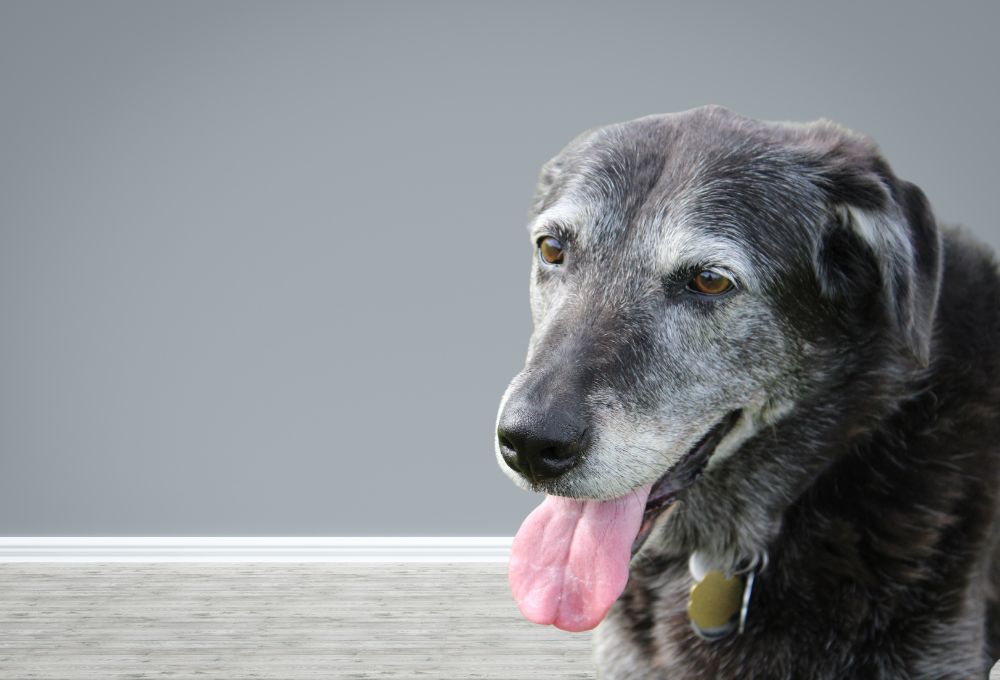
Occasional panting can be normal, but if you notice that your senior dog is excessively panting, it’s important to understand the cause to address the problem.
In this article, we will explore the reasons behind senior dogs panting at night and provide useful tips to help you alleviate their discomfort and ensure their well-being.
Why do dogs pant?
Panting is a natural cooling mechanism for dogs. They don’t have sweat glands like humans, so they regulate their body temperature through panting. When dogs pant, they inhale cool air and exhale warm air, which helps dissipate heat from their bodies. However, excessive panting in senior dogs, especially at night, may indicate an underlying issue that requires attention.
Common Causes of Senior Dog Panting at Night
Pain or Discomfort
Senior dogs often experience joint pain, arthritis, or other age-related conditions that can cause discomfort. This discomfort may be more pronounced at night, leading to panting as a response to the pain.
Respiratory Issues
Respiratory problems such as chronic bronchitis or collapsing trachea can make it difficult for senior dogs to breathe properly, especially when lying down. As a result, they may pant excessively to compensate for the restricted airflow.
Anxiety or Stress
Older dogs may develop anxiety or experience stress due to various factors like changes in their routine, environment, or the presence of new family members or pets. This anxiety or stress can manifest as panting during nighttime.
Medications
Certain medications prescribed for senior dogs can have side effects that cause panting. It’s essential to review the medication’s instructions and consult with your veterinarian if you suspect it might be contributing to your dog’s panting at night.
Heart Disease
Heart disease is prevalent in older dogs and can lead to fluid buildup in the lungs, causing difficulty in breathing and panting. If your senior dog exhibits panting along with other symptoms such as coughing, lethargy, or loss of appetite, it’s crucial to consult a veterinarian promptly.
Cushing’s Disease
Cushing’s disease is a hormonal disorder that affects dogs, primarily in their senior years. It can cause excessive thirst, panting, weight gain, and other symptoms. If you suspect Cushing’s disease is the underlying cause of your dog’s panting, seek veterinary advice for proper diagnosis and treatment.
Cognitive dysfunction
Cognitive dysfunction, also known as dementia, disrupts a dog’s sleep schedule. As a result, your senior dog may wander around the house at night, get lost and nervous and start panting.
How to calm a panting dog
Create a Comfortable Sleeping Environment
Ensure your dog has a cozy bed with appropriate support to alleviate any joint or muscle pain. Use comfortable bedding and provide a warm, draft-free sleeping area.
Regular Veterinary Check-ups
Schedule regular check-ups with your veterinarian to monitor your senior dog’s overall health. This allows early detection of any underlying conditions that may contribute to panting.
Manage Anxiety and Stress
If your senior dog experiences anxiety or stress, create a calm and soothing environment for them. Use techniques to help them feel more at ease, like providing a safe space, using pheromone diffusers, playing relaxing music, using CBD oils, or Bach Remedy.
Adjust Medication Dosage
If your dog is on medication, consult with your veterinarian to ensure the dosage is appropriate. Adjustments may be needed to minimize side effects that could lead to excessive panting.
Provide Adequate Ventilation
Ensure the room where your senior dog sleeps has proper ventilation to maintain a comfortable temperature. This can help prevent overheating and excessive panting.
Use Calming Techniques
Explore calming techniques such as gentle massage, acupuncture, or natural supplements (under veterinary guidance) to help your senior dog relax and reduce nighttime panting.
Make Adjustments at Home
If your dog is experiencing cognitive dysfunction, you can build a barrier with cushions around the bed to prevent them to walk around the house at night. Also, pay attention to all the areas in the house where they can get stuck, like behind the doors, in the corners, under the table, etc. Try to make these areas not accessible for them, especially at night.
When to Consult a Veterinarian
If your senior dog’s panting at night persists or is accompanied by other concerning symptoms such as coughing, wheezing, or lethargy, it’s crucial to consult a veterinarian. They can assess your dog’s specific situation and recommend appropriate diagnostic tests or treatment options.
As a general rule, you should schedule regular check-ups with your vet to monitor any changes in their health.
FAQs
Excessive panting may indicate an underlying issue. The most common causes are pain or discomfort, anxiety or stress, respiratory issues, side effects of medications, dementia, heart disease, and Cushing’s Disease. Please check with your vet to understand the cause and properly address the issue.
You can create a calm sleeping environment by providing a cozy bed, using calming aids such as pheromone diffusers or relaxing music, and ensuring the room has proper ventilation. Consult with your vet if the panting continues.
Calming a dog with dementia at night requires creating a safe and comforting environment. Maintain a consistent routine, provide night lights to prevent disorientation, use soothing music or white noise, and consult with your veterinarian for possible medication or supplements to help manage the symptoms
Excessive panting and increased water consumption in senior dogs can be signs of various underlying health issues. It is essential to consult with a veterinarian to investigate potential causes such as kidney disease, diabetes, Cushing’s disease, or hormonal imbalances and develop an appropriate treatment plan.
Yes, anxiety or stress can manifest as excessive panting in senior dogs, particularly during nighttime.
Conclusion
Senior dog panting at night can be distressing for both the dog and the owner. Remember to be patient and empathetic with them. As they aged, they will need special attention and care.
The first step is to understand the causes, then you can implement appropriate strategies to help alleviate your dog’s discomfort and improve their quality of sleep. Some of these strategies include creating a comfortable sleeping environment, managing anxiety, sticking to a routine, and consulting with your veterinarian for professional guidance.
Recent Posts:
- My Dog Loves His New Cooling Mat
- Is the Dogo App Worth It? Honest Review After Training My Dog
- Amazon’s Top Black Friday and Cyber Monday Deals for 2024: Dog Products Edition
- Top Pet Trackers for Sending Your Dog with a Pet Sitter
- Should Dogs Wear Bells?
Recent Posts
This summer, the temperatures are getting extremely high, and as you may know, dogs don’t sweat like humans to regulate their body temperatures. They mostly use their paws and breathing to cool...
Is the Dogo App Worth It? Honest Review After Training My Dog
Training your dog shouldn’t feel like another chore, but it often does because, unless you’re a professional trainer, you have to research everything yourself first. And that research can take...
